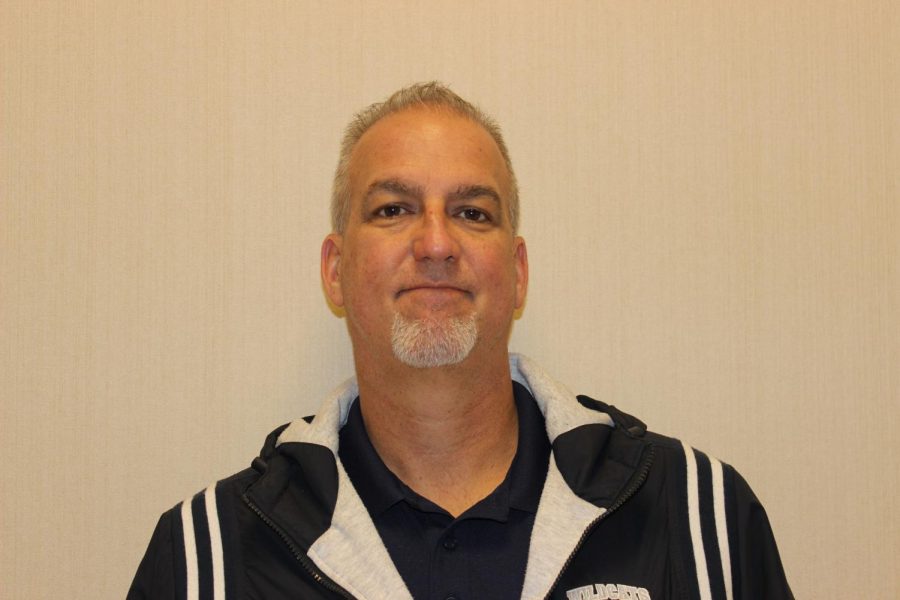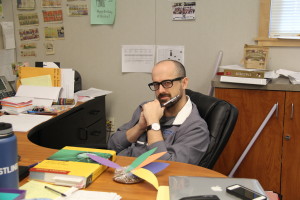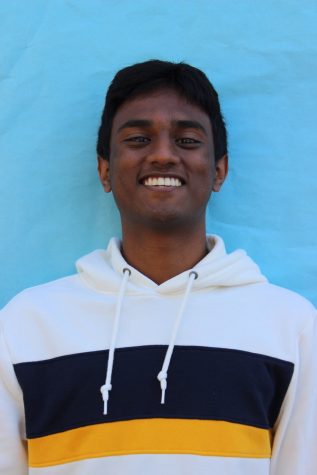Bob Spain supports DV students and staff as assistant principal
May 14, 2019
In 2012, Mr. Bob Spain was diagnosed with myeloma — a cancer he was told was incurable — but he beat all odds to survive. Seven years later, he brings that same tenacity to Dougherty as a new assistant principal intent on bolstering the growth of students and staff alike.
Spain grew up in Fremont, CA, in a primarily blue-collar area where attending college was not a common path. Many of his neighbors and close adult figures worked as laborers, especially at the nearby General Motors and Ford automobile plants. His father, a piano salesman, was the “odd man out” in this job spectrum.
Despite the labor-oriented environment in which he grew up — with college not a necessity — Spain’s parents pushed him toward higher education so he could pursue a wide array of career opportunities beyond labor. With their support, Spain graduated from California State University, East Bay in 1986 with a degree in education, becoming the first member of his family to graduate from college.
From that point on, Spain earned his teaching credentials and began teaching at Pittsburgh High School in 1993. A year later, Spain returned to Irvington High School, his alma mater, where he remained for the next 13 years, garnering accolades such as a “Teacher of the Year” award in 2007. That same year, Spain moved to Dougherty Valley High School at the school’s establishment and taught English for the first three years and P.E. for the next two while coaching the football team.
“It was fun. It was neat, creating this whole new campus, a whole new atmosphere … It was a rare opportunity to get to open a school,” Spain recounts.
However, in the middle of his tenure at Dougherty, Spain was forced to take a leave of absence in 2012 due to his diagnosis with myeloma.
Looking back, Spain jokes about his diagnosis, “[Myeloma is] some blood cancer… not a cool blood cancer… This is the one that nobody really knows about.”
However, at the time, the situation was much graver. Initially, Spain was told by doctors that he could only expect to live for three more years.
“When you are given an expiration date, [it’s] kind of a freaky thing … it’s caused me to step back and [realize that] time is very precious.”
Fortunately, Spain’s oncologist cleared up misconceptions about his condition and helped him work through treatments to eventually beat the cancer.
Spain’s diagnosis was not a completely novel situation for his family, however; Spain’s son was diagnosed with cystic fibrosis at age three and his wife was also diagnosed with cancer. Having to deal with these conditions has taught Spain about the importance of perseverance and unfaltering humor.
Spain quips, “We always joke that we’re like a family of cockroaches … Life keeps battling us but we keep doing what we do … [You’ve] got to laugh because if you don’t, you just sit around and feel bad for yourself … I don’t want to do that.”
While it was tempting to wallow in his diagnosis, Spain recognized that he needed to keep pushing forward.
“There’s times when you feel like, ‘If I get knocked down one more time, I’m just going to stay down.’ But [with cancer] there’s really no alternative …. Quitting life? Forget that.”
The perspective Spain gained through his battle with cancer has influenced his educational ideology and approach to administration. He stresses that as a teacher, he considered supporting students to be more important than the curriculum itself; he strived to establish genuine connections with the students similar to the ones he formed while in school.
“There are teachers who really like students and understand that this is a difficult journey … I’ve always been one of those teachers … We’ve got to give them things that they feel that they can succeed with, and that comes down to making connections with any teacher that they can on campus.”
In becoming an administrator, Spain hopes to extend this ideology to a larger group of people. Specifically, Spain appreciates how his position allows him to support all types of teachers, and by extension, all types of students. In fact, fostering inclusion on campus is one of his major goals.
Spain noticed that amidst the academic-centric student culture at Dougherty, there are many students whose interests lie beyond the traditional path of higher education. He hopes to give these students the opportunities and support to succeed in different career paths.
As a result, Spain is working with PE teacher Mr. Jack Sorenson to develop an Intro to Construction class for the upcoming school year.
“We’re really excited about offering students [this class,] and we’re hoping that students get to see that this may be a viable opportunity … [They’ll realize that] ‘maybe that’s a pathway for me to earn a living,’” Spain explains.
In addition to supporting students through expanded CTE classes, Spain has also tried to change the way administration interacts with students. He specifically wants to move away from traditional disciplinary action toward a more growth-based approach focused on helping the student. As such, he tries to understand the nuances in students’ lives before helping them move forward and become a better person.
“As a part of growing up, kids make mistakes. That’s why I have a job … [but we need to] pick ourselves back up and figure out where we’re going next … That’s what’s important.”





